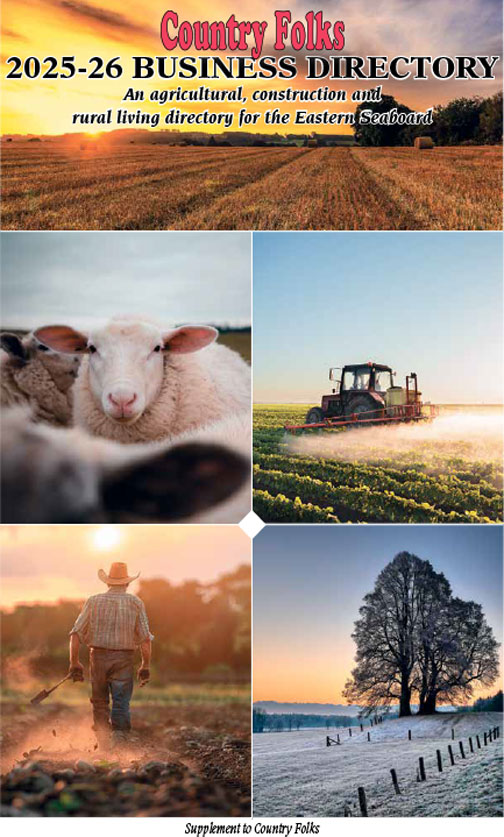November 5, 2025
UNH Extension conference draws homesteaders & farmers
More than 100 people attended the annual North Country conference and trade show in October, sponsored by UNH Cooperative Extension. For the first time it was held in one of the new exhibition buildings at the Lancaster Fairgrounds. “The topics were chosen to be particularly of relevant to small-scale farmers as well as ‘homesteaders’ interested in becoming more self-resilient but not necessarily seeking financial gain,” explained William “Bill” Hastings, who’s been on UNH Extension’s Food & Agriculture team for five years with Coös County. Four hands-on activities took place outdoors in a separate track. Kendall Kunelius of UNH Extension taught the fundamentals of chainsaw maintenance and then used a teaching tractor to cover the basics of its operation, safety and purchase. Franconia Jones of Mount Cabot Maple demonstrated shiitake mushroom log inoculation; Olivia Saunders of UNH Extension demonstrated how to become a seed saver. Eight 30-minute indoor talks were presented as the other track: four by Extension speakers and four by those with special expertise. Mary Macdonald of Genuine Local in Laconia described how this family-owned, mission-driven business helps farmers with an oversupply of fresh food to preserve and sell their harvest. “We’re reaching out in person to explain to farmers how they can use our shared-use production facility for value-added small-batch co-packing, helping them to deal with an unexpected surplus of garden-fresh food,” Macdonald said. This entrepreneurial family’s been in working together since 2016. In 2021, the team built a new 9,000-square-foot facility. The Genuine Local website describes all the food and beverage services the company offers. Janice Mercieri of White Mountain Apiary in Whitefield, which she runs with her husband Joseph, titled her talk “Considerations Before Getting into Beekeeping.” A single healthy hive can house 60,000 bees, and just like all livestock, she emphasized, their owners must take care of them. “Keeping bees can increase agricultural production on your homestead, but it’s not cheap, when you consider the equipment you must acquire, including safety equipment,” the beekeeper said. “It’s a long-term investment.” She spoke about keeping close track of mite counts. A low mite count is an important factor in ensuring that hives can survive the region’s cold-weather months. She also warned, “Massachusetts continues to aggressively test for American foulbrood (AFB) because of a large outbreak along the I-91 corridor. All bees and used equipment coming into Massachusetts must be inspected. You must also have a health certificate for all bees or equipment coming from the Bay State. Be sure to register your apiary with the New Hampshire Department of Agriculture so it can inform you if AFB should be identified near your hives.” Registration is free, voluntary and does not need to be renewed unless you change your apiary’s location. Six Saturday morning lessons will be offered by the North Country Bee Keepers Association from Feb. 7 - March 14, 2026, with scheduled hands-on time in May in hives. To register, go to whitemountainapiary.com/store/2026-bee-school . Heather Bryant (UNH Extension) presented the results of a two-year sweetpotato variety trial. Its results were more variable than was expected because the garden plots were more random than usual. The tubers were planted nine inches apart with six feet between rows. For planting, the soil should be 65º F (typically in June). Sweetpotatoes should be harvested and then “cured” indoors at 80º to 85º (or as close as possible) so their sugars can form over a period of four to seven days. They should then be kept above 55º – making them unsuitable for selling in unheated farm stands. Bryant and Hastings presented a lot of information about small-scale cover crops, starting with the importance of soil testing. Some cover crops fix nitrogen and others phosphorous. All have specific planting seasons and other requirements. Winter rye helps prevent erosion. Radishes and mustards help loosen compacted soil. Sorghum/sudangrass, which grows up to 12 feet tall, is recommended for cover crop use a year before planting blueberries. Katrina Klobuchar (UNH Extension) talked about raising backyard chickens, emphasizing their space and ventilation needs plus their manure challenges. Each chicken produces 70 lbs. of manure a year, which contains high levels of nitrogen that, to be useful, must be mixed with carbon-rich materials. Organic farmer Sue Greene of Slopeside Farm in Lancaster spoke on how to grow easy-cut flowers for farm stand bouquets. She emphasized the importance of maintaining clean containers to place or keep stems, plus the care needed in setting up the timeline for cutting and selling the flowers you raise. “Disinfect your scissors. Keep cut blooms out of the direct sunlight,” she urged. The Coös County Conservation District had two successful ag grant applicants – Stephanie Kelleher of the organic, no-till Uphill Farm in Whitefield and Scott Mason of the diversified Northwinds Farm in Stratford – to discuss the projects they were able to partially pay for, thanks to a privately funded statewide program designed to support and encourage farmers to build climate resilience. Hastings led the final indoor presentation, “Diversifying Northern Orchards: Cold-Hardy Fruits & Nuts.” He aimed to broaden the variety that local farmers may consider growing, ranging from apples, pears and plums to sour cherries. Cold-hardy peaches in this area are apt to be late blooming, meaning that in some years the fruit may not have time to ripen. He urged farmers to consider planting a variety of grapes as well as both bite-sized male and female kiwiberries. Figs, he noted, can be raised in greenhouses. Fifteen sponsoring vendors were involved, including several nonprofits, such as the NH Audubon Society, which is trying to promote state legislation to reduce the widespread distribution of rodent poisons that appear to be harming the number of bald eagles and ospreys now living in the state. The NH Free State Project also staffed a table, distributing booklets and a farm magazine that touts what its members see as the close fit between their beliefs ( welcome@fsp.org ) and those of many independent-minded farmers. The Littleton Food Co-op , which buys nearly 30% of its products from within 100 miles of its open-to-all supermarket, had informational packets for NH and Vermont farmers so they could apply to become vendors. The Northeast Organic Farming Association of NH gave out its “2025 Organic Farm & Food Guide,” organized by county. by Edith Tucker





